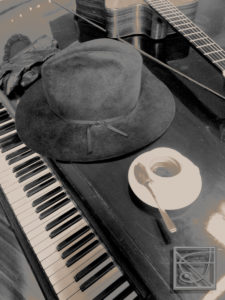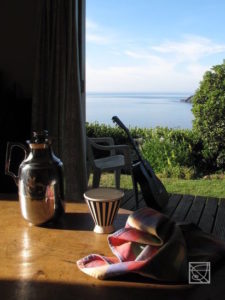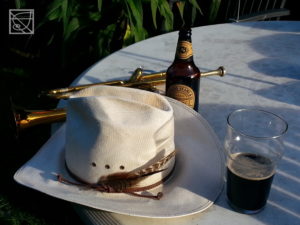
Journalism is fast forsaking paper,
a pity for so many reasons, though not if you’re a tree.
I bought my first newspaper from a vendor on the street near my school, so I’d have been about twelve years old. It became a habit, informing me on the wider world and, acting as a barrier against my immediate world when I wished to exclude it. My father was in his brief parabola as a Television Personality (these days they’re called Celebrities, a curious term as it implies that something is worthy of celebration) and had bought, near the film studios so very far from beloved Cornwall, a rambling house that started out all low megalithic walls and ships timbers in the Domesday Book and expanded through the centuries into a Regency Pretension with French Windows and walls so slight that an iron brace had been put through the wing with a cross on one end and a letter ‘S’ on the other to stop the stuccoed brickwork bulging under the weight of the roof. I was allocated a bedroom somewhere in the late Seventeenth Century with elm floorboards that would today each cost the price of a dinner at the Ritz. A window with wobbly glass gave on the house where lived Jill and Gerry with their daughters Linda, Stella and Wendy who during my limited leisure leavened the monastic chill of my daily sorrows. Their house had been built as private library to J. L. Garvin, the Editor of ‘The Observer’, whose bronze head by the American sculptor Jo Davidson dominated our grandest chamber.
That icy morning, the bronze eyes watched me from their gothic alcove as, dashing in my socks towards hot porridge I slipped on the stairs and, tobogganed all four flights on my back to land shocked and winded on the cold tiles in the hall.
I was chided, inspected and, fed the porridge. My bones too sore for dressing myself, I was manipulated into the hated school uniform. The reading from a previous Morning Assembly came to mind:
“I tell you the truth, when you were young, you were able to do as you liked; you dressed yourself and went wherever you wanted to go. But when you are old, you will stretch out your hands, and others will dress you and take you where you don’t want to go.”
For the first time I felt sympathy for Saint Peter. I stepped out into the sleet.
My heart sank, as it did daily while I waited for the slim green coach that glided past the house of the children’s author Enid Blyton and the mysterious residence of the considerable movie star Dirk Bogarde before winding out through the beech woods into the dazzle of the frosted fields.
We slid on Saucy Corner. We slid again when we stopped at Penn Pond where the Gypsies were breaking the ice to water their horses. We missed the connection into town.
I blew glumly on my hands until the next bus came. It had more wheels and slid less, though with its two stories it rolled more, straining my bruised ribs. I arrived late at my classroom and was scolded and quizzed. Trying to gloss an awkward moment, I assumed a pleasant social manner and said,
“Well, it’s really rather complicated, but if you have the time, would you like to hear the whole story?”
The master’s normally florid face went livid above the muffler he wore to augment his gown against the chill. The purple capillaries in his nose stood out. I had not before fully registered through my liberal infancy the extent to which grovelling was expected of schoolboys, nor had I grasped that it was acceptable in that time and place to hit us quite so much or so hard. I now learned.
The time I spent standing in the corridor was not all bad; there was a radiator out there, and I sagged my bruises against it gratefully while French verbs were parsed on the other side of the wall. At length the day ended in an early twilight. I was told that, while my appalling insolence merited Detention and Worse, I would be released because of the extreme weather. My duffel coat had been confiscated because duffel coats were banned; viewed as somehow subversive. I’d also been caught and punished by my housemaster for wearing a cricket sweater under my shirt. I was cold.
I bought my newspaper and ran for the tall, bright bus and swayed along within the frost flowers on its windows behind my paper, glad of the minimal heat.
Many corners later I was decanted alone at Penn Pond bus stop. I shivered. A muffled voice hurrying past told me that the slim green coach home had been cancelled because of the snow.
It is difficult to believe: in those days we did not have phones in our pockets. But, there were plentiful public ones. They were housed in tall red boxes, boxes furnished with an unbelievable seventy-two little windows in three sides, from the pissy concrete floor to the ceiling where lurked a dim electric light. A heavy sprung door with a leather restraining strap opened on a cigarette-smelling chamber with just enough room for one adult to stand upright facing a black-painted presence with a rotary dial, a banana-shaped receiver on a stout flex, a slot for your coins and, buttons ‘A’ to connect you and, and ‘B’ to get your money back should it fail. I felt in my pocket. My coins were in the satchel of the newspaper vendor. I set out on foot.
I had a wristwatch, a gift from my grandparents. At the end of the hour by its luminous dial I had perhaps gone one mile and was now pushing my way through chest-high snow drifts, kept warm – if you could call it that – by only my exertions, woollen gloves and socks, regulation school mac and cap and, my newspaper tucked inside my blazer and spread across my chest.
It ends happily. My father had finally looked at the clock, wondered where I’d got to, put down his pencils and set out in his indestructible Ford V8 to look for me. I heard the familiar rumble of its engine just as I was thinking I’d like to lie down in the snow and go to sleep. He assuredly saved my life, perhaps with a little help from my newspaper.
When, having survived childhood and my training as an Artist, I started my first serious earner on Jack de Manio’s ‘Today’ programme – now a harsher, bigger beast under the agile whip of John Humphries – I had to digest seven newspapers a day before breakfast in the small hours. I met them again, cold news wrapped around the evening fish and chips to keep them hot.
Today in Cornwall it is cold. But ah, not REAL cold.
JXC Spring, Summer… 2017
Related Images:

 …And,
…And,



 Our weather is changeable, our climate comfortable. In the toe-numbing Russian and Canadian snows, and even more while sweating under the Equator’s plunging sunsets I learned to yearn for the sort of mild damp Cornish Summer’s Day that we’re all so sniffy about.
Our weather is changeable, our climate comfortable. In the toe-numbing Russian and Canadian snows, and even more while sweating under the Equator’s plunging sunsets I learned to yearn for the sort of mild damp Cornish Summer’s Day that we’re all so sniffy about.